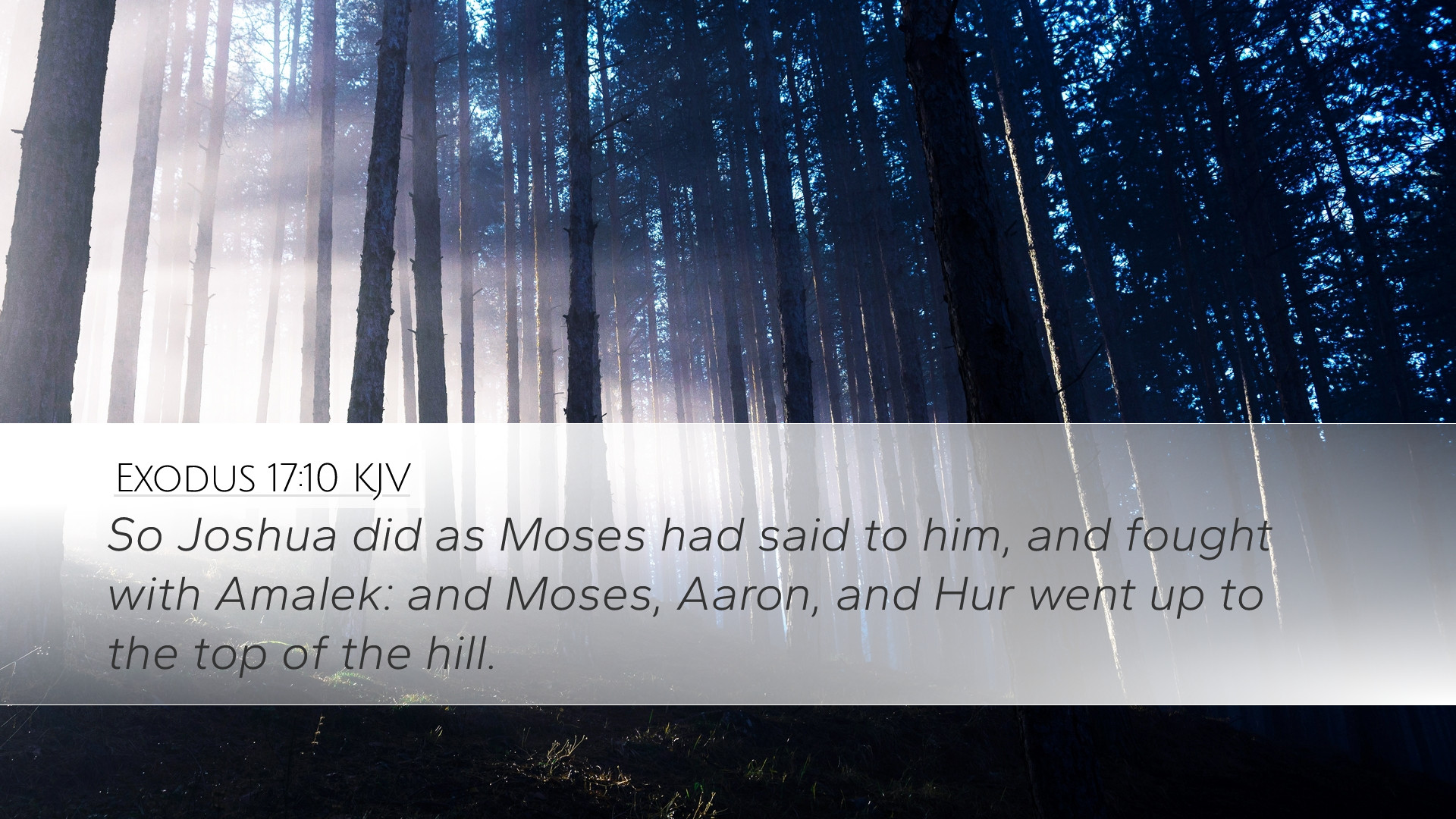Commentary on Exodus 17:10
Bible Verse: "So Joshua did as Moses said to him, and fought with Amalek; and Moses, Aaron, and Hur went up to the top of the hill."
Introduction
Exodus 17:10 marks a pivotal moment in the wilderness wanderings of the Israelites. This verse highlights the collaborative efforts of leaders in Israel, namely Moses, Aaron, and Hur, while underscoring Joshua's emerging role as a military leader. Each character's actions and the dynamics between them offer rich insights for pastoral reflection and scholarly examination.
Contextual Background
The Israelites’ exodus from Egypt sets the stage for the confrontation with Amalek. The Amalekites represent significant opposition, symbolizing the perennial struggles faced by God’s people. This battle occurs shortly after Israel's miraculous provision of water and manna, showcasing the constant need for trust in God amid trials.
Moses as a Leader
Matthew Henry emphasizes Moses' role not only as a prophet but also as a leader who intercedes on behalf of the people. By ascending the hill to pray, Moses demonstrates a crucial principle of leadership: reliance on divine assistance in times of conflict. His uplifted hands symbolize prayer and dependence upon God, which are central themes in Israel's story.
According to Albert Barnes, Moses’ actions reflect the significance of spiritual leadership in warfare. The act of holding up his hands during the battle serves as a representation of ongoing intercession. As his hands were raised, Israel prevailed; when they fell, Amalek gained the upper hand. This dynamic illustrates the connection between spiritual authority and earthly conflict.
Joshua's Emerging Role
Joshua's obedience in this verse marks the beginning of his ascension as a significant leader within Israel. Adam Clarke notes that Joshua’s willingness to engage in battle indicates his readiness to take on responsibilities. He is not merely a follower; he is actively participating in God’s mission. Clarke highlights that this battle served to prepare Joshua for his future leadership as the successor to Moses.
Furthermore, Henry observes the importance of Joshua’s preparation through military experience, emphasizing the necessity of practical engagement in leadership roles. This teaches pastors and leaders the value of equipping those who will take on future responsibilities within the church.
The Role of Aaron and Hur
The presence of Aaron and Hur provides essential support to Moses, showcasing the need for shared leadership. Barnes articulates that their assistance reflects a principle of teamwork in ministry. As they hold up Moses’ arms, they not only facilitate victory in battle, but they also illustrate the biblical concept of mutual support among leaders.
Collaboration and Prayer: The cooperation between these leaders emphasizes the Christian imperative to bear one another’s burdens (Galatians 6:2). The involvement of Aaron and Hur underscores the necessity of having others to support us in our spiritual undertakings, a vital lesson for contemporary church leadership.
Theological Implications
- Divine Sovereignty: This passage showcases God's sovereignty over the conflict between Israel and Amalek. It is a reminder that ultimate victory belongs to God and that all earthly efforts must be undergirded by spiritual vigilance.
- The Power of Prayer: The connection between Moses’ prayers and the outcome of the battle invites deep theological reflection on the efficacy of prayer. It advocates for constant communication with God amidst life's battles.
- Community in Ministry: The collaborative aspect of Aaron, Hur, and Joshua signifies the church's body, where every member plays a unique role, fostering unity and strength in ministry.
Conclusion
Exodus 17:10 serves as a robust narrative for understanding leadership, community, and the power of prayer in the pursuit of God’s mission. By examining the interdependent roles of Moses, Aaron, Hur, and Joshua, pastors and scholars are encouraged to embrace shared leadership and to remain steadfast in their reliance on God’s divine assistance. This passage resonates as a timeless reminder of communal effort as believers confront both spiritual and practical challenges in their lives and ministries.


